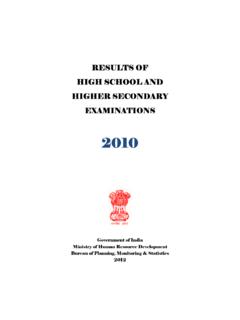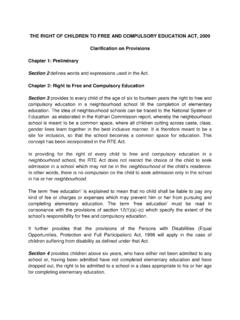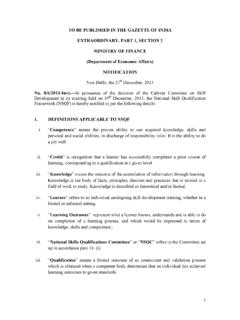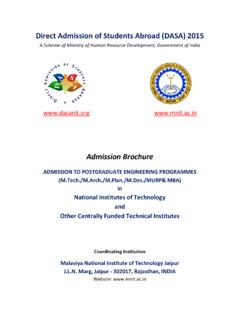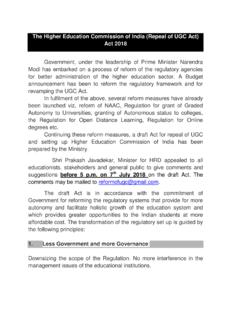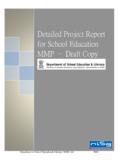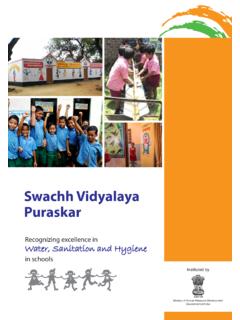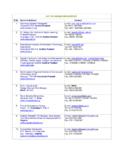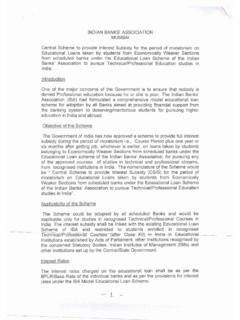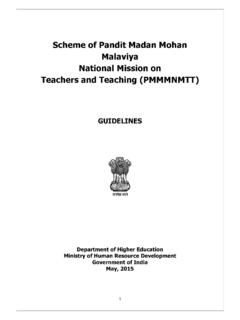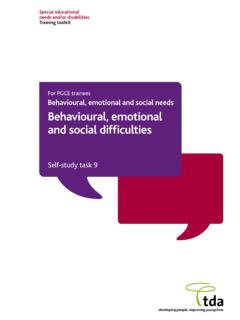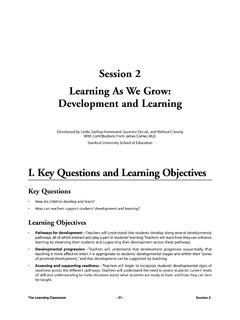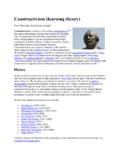Transcription of Draft Learning Outcomes
1 Draft Learning Outcomes The Nationa l Policy on Education 1986, and the Programme of Action 1992 emphasised that Minimum Levels of Learning MLLs) should be laid down and children's Learning should periodically be assessed to keep a track of their progress towards ensuring that all children acquire at least the minimum levels of Learning . Learning Outcomes are assessment standards indicating the expected levels of Learning that children should achieve for that class. These Outcomes can be used as check points to assess Learning at different points of time. The Learning Outcomes would help teachers to understand the Learning levels of children in their respective classes individually as well as collectively. Learning Outcomes should be the point of reference for conducting achievement surveys. Hence it is necessary that the defined Learning Outcomes are also shared with parents and community at large. It has now been proposed to include the defined Learning Outcomes in the Central Rules of the Right of Children to Free and Compulsory Education (RTE) Act, 2009.
2 These Rules will be applicable to all schools including government, aided and private schools. The NCERT has developed Draft Learning Outcomes for each class in Languages (Hindi, English and Urdu), Mathematics, Environmental Studies, Science and Social Science up to the Elementary stage. Care has been taken to develop the Outcomes following consultations with States, UTs, SCERTs and education experts from organizations including civil society organizations. The Learning Outcomes developed by NCERT are the minimum levels of Learning to facilitate the monitoring of students against expected benchmarks. Comments/suggestions to this Draft document are invited by midnight 31st January, 2017, these may be sent to the following e-mail address: i CONTENTS. Foreword iii-iv Preamble v-viii Learning Outcomes at Elementary Stage 1. Hindi 1-30. (i) Primary Stage (I to V). (ii) Upper Primary Stage ( VI to VIII). 2. English 31-46. (i) Primary Stage (ii) Upper Primary Stage 3.
3 Urdu 47-61. (i) Primary Stage (ii) Upper Primary Stage 4. Mathematics 62-87. (i) Primary Stage (ii) Upper Primary Stage 5. Environmental Studies (III to V) 88-99. 6. Science (VI to VIII) 100-107. 7. Social Science (VI to VIII) 108-118. ii PREAMBLE. Why This Document The literature on Education for All' (EFA), in the last three decades emphasised on quality of education. It has been considered in terms of enrolment, retention and achievement. It further included desirable characteristics of learners, Learning processes, facilities, Learning materials, contents, governance and management and Learning Outcomes . Improving the quality of Learning has consistently been in focus under the Sarva Shiksha Abhiyan (SSA), and the Right to Education (RTE) Act. All the National Curriculum Frameworks developed by the NCERT and other important government initiatives have also included quality as a prime goal. It envisaged that all children learn the basics and have opportunities to acquire the transferable skills needed to become global citizens.
4 This demands setting goals that are clear and measurable. Thus, it is imperative that within a system of education, the national/state educational bodies need to be informed about how well the system is doing to make rational decisions by administrators, planners and policy-makers. Various Assessment Surveys at the National/ State level (NAS/SLAS). are some of the initiatives in this direction. In addition to these, different stakeholders at the school and community level also play a crucial role towards quality improvement in education. As per the recent Global Monitoring Report (GMR)-2015, impressive gains in access to education have occurred in developing countries including India but improvement in quality still remains a concern. In India, different achievement surveys such as the Annual Status of Education Report (ASER), reported wide disparities in students' achievement of basic skills across states, which was also affirmed by the National Achievement Survey (NAS) of class III, (MHRD, 2014).
5 Reports of Joint Review Missions for SSA in the past few years also mentioned that the Learning levels of children are not up to the desirable level in spite of all the efforts made by the States/UTs in terms of timely provision of teaching- Learning and resource materials, teacher deployment and regular monitoring. These report a decline in Outcomes of reading ability as well as numerical/ mathematical ability which is a major concern at present. Keeping this in view, quality as measured by Learning Outcomes to be achieved by all, especially for literacy, numeracy and essential life skills is crucial. The focus of Twelfth Five Year Plan for basic Learning as an explicit objective of primary education and the need for regular Learning assessments to make sure quality goals are met. It is also in consonance with the recommendations of GMR-2015 and the Sustainable Development Goals. Thus, monitoring of quality through assessments of Learning Outcomes at regional, national, and international levels is important.
6 At the same time a vigil at the ground level by different stakeholders such as parents and community, for their accomplishment makes the system informed and accountable to adopt corrective measures at appropriate levels. v Most often, teachers are not clear about what kind of Learning is desired and the criteria against which it could be use textbooks as the complete curriculum and assess children using questions given at the unit end exercises. The contextual variations in textual material and variations in pedagogy adopted are generally not taken into account, for there are no criteria to assess them. The Learning Outcomes for each class not only help the teachers to direct their teaching- Learning in the desired manner but make other stakeholders especially the parents/guardians, School Management Committee (SMC) members, community and the state functionaries be responsible and alert towards their role for ensuring quality education. So, the Learning Outcomes defined explicitly can guide and ensure the responsibility and accountability of different stakeholders for the accomplishment by expectations in different curricular areas.
7 Why the Shift The National Policy on Education 1986, revised in 1992 and the Programme of Action 1992 emphasised that the Minimum Levels of Learning (MLLs) should be laid down and children's Learning should periodically be assessed to keep a track of their progress towards ensuring the achievement of NPE goal that all children should acquire atleast minimum levels of Learning '. The MLLs developed class-wise and subject-wise for primary stage in 1992 in the form of competencies were highly product-oriented and had a limited scope for assessment of the overall development of children. A radical shift came almost a decade ago when the child's capacity to construct knowledge as a natural learner was recognised as central to the transaction of the curriculum and the teacher's role was primarily as facilitator of the Learning process. The knowledge, thus gained, is an outcome of their engagement with the world around when they explore, respond, invent, and make meaning out of that.
8 It means that the focus shifted to the process of Learning . It envisaged conceptual understanding as a continuous process the process of deepening and enriching connections acquiring more layers of dispositions, emotions as an integral component of cognitive development, making meaning and developing the capacity of abstract thinking and reflection. The overall development of a child through education, conceptualized as a fundamental right under the Right to Free and Compulsory Education Act 2009, had been a priority of almost all policy documents. The document Minimum Levels of Learning at Primary Stage' too recognised this yet expressed difficulty to deal with the psychomotor and affective domains. The reasons for this were mentioned as: difficulty to assess affective qualities with precision and through paper-pencil test, as they are intangible and subjective, influenced by personal preferences and prejudices besides the uncertainty for their full development.
9 The document considered them to be a part of the process of development and change in the students' personality rather than being the final product of specific inputs and processes. Against this backdrop an exercise was undertaken to relook into the whole process with a fresh perspective and devise Learning Outcomes for different curricular areas of the elementary stage (Classes I- VIII). vi About the Document The present document includes Learning Outcomes mentioned distinctly for each class in Languages (Hindi, English and Urdu), Mathematics, Environmental Studies, Science and Social Science up to the Elementary Stage. The document is meant for all stakeholders especially the parents/guardians, teachers, SMC and community members. Some features of the document are given below: To make it user-friendly, simple language has been used as far as possible across the document. The section under each curricular area comprises a brief understanding about the nature of the subject, followed by the curricular expectations, which are the long-term goals that students need to acquire over a period of time, and therefore spelt out stage wise.
10 The Learning Outcomes defined class-wise are process-based which provide the check points that are measurable in a qualitative or quantitative manner to assess the progress of a child as per the expected holistic Learning for overall development of a child. To help the teachers understand and achieve the Learning Outcomes as per the curricular expectations, some suggestive pedagogical processes are provided in the columns adjacent to that of Learning Outcomes . Using contextual resources and appropriate Learning processes, the teachers can design and provide a variety of Learning situations/opportunities as per the need of different learners in an inclusive classroom. The pedagogical processes are suggestive and do not correspond one-to-one with the Learning Outcomes mentioned in the adjacent column but may be looked at holistically. The teachers may adopt/adapt and can even design many more as per the availability of resources and local context. Care has been taken that the Learning Outcomes defined in each curricular area are spirally linked in terms of age appropriateness and complexity within and across curricular areas and stages.
